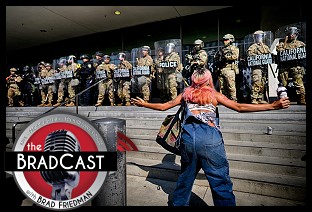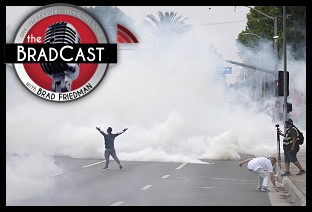 Ever since last week's disclosures about our massive surveillance state began pouring out from the Guardian's Glenn Greenwald, via leaked documents from NSA contractor Edward Snowden, detractors of the leaks have been pillorying them both for, among other things, supposedly putting national security at risk.
Ever since last week's disclosures about our massive surveillance state began pouring out from the Guardian's Glenn Greenwald, via leaked documents from NSA contractor Edward Snowden, detractors of the leaks have been pillorying them both for, among other things, supposedly putting national security at risk.
The attacks have come from both the Right and non-Right this time around, unlike during the Bush Administration when the attacks on whistleblowing came largely from the Right (and from some elected Democrats.)
At the end of this article over the weekend, I wrote a bit about how bizarre it's been to see partisan Obama supporters literally switching places with their partisan Bush-supporting counterparts, using arguments that are virtually identical to those by made by Republicans to defend Bush on these very same matters during his administration. Those same arguments, almost to the phrase, are now employed by many Democrats to defend the Obama DoJ's crackdown on whistleblowers, secret subpoenas of journalists and, now, as a call to arms against Snowden and Greenwald both for, somehow, putting the nation in danger. (At the same time, as I've also noted on several occassions, it's also amazing to witness some Republicans who've suddenly discovered a new found concern about Big Government Executive Branch overreach and the secret surveillance of U.S. citizens.)
Related to all of this, and true to many of those who have been critical of Snowden and Greenwald from both the Democratic and Republican side, is that while the recent disclosures have put us at risk (or something), as they argue, the issue of our massive, secret, privatized, surveillance state is, nonetheless, a very important issue about which we must have a public debate as a nation. On that, detractors from both sides seem to agree.
Here are just a few examples of that and some thoughts on how twisted this logic seems to be...
Josh Marshall at TPM wrote soon after the disclosures began coming to light, that "Snowden and many others have now said that these leaks are important and justified because the public needs to decide whether this is done in their name." Marshall says he "basically...disagree[s] with that", and then adds...
In a more recent, very frank piece acknowledging some of his conflicting thoughts on all of this, Marshall also admits...
Sen. John Thune (R-SD) on MSNBC stated his opposition to Snowden's leaks and called for his prosecution. But then, when asked by Andrea Mitchell if he believes the sweeping nature of the surveillance, as detailed in the documents released by Snowden, is too broad and needs to be narrowed, Thune responded...
My friend Bob Cesca at The Daily Banter, in an article widely cited by Obama supporters over the last several days, charges (with no small amount of bloggy bombast and a fair share of unsubstantiated assertions) that the "NSA bombshell story [is] falling apart under scrutiny"! He then goes on to slam Greenwald's story for "careening way off the empirical rails into hysterical, kneejerk acceptance of half-assed information". But he also concedes:
Finally, for now, top level Presidential advisers of both George W. Bush and Barack Obama seem to agree. Bush's former unapologetically partisan Press Secretary Ari Fleischer has taken the opportunity to stand four-square with Obama and his spying programs, for which he credits his old boss for putting in place. He has taken to Twitter to thump his chest, calling for the DoJ to "throw the book" at Snowden, and to taunt: "Real whistleblowers don't flee the country". Then, he admitted on CNN...
...And Obama's former Senior Adviser David Axelrod on MSNBC, also decried the leaks, before admitting...
Well, that's all nice. It seems all of them, while disagreeing with Snowden's leaks, agree with his stated purpose, and each other, on one very key --- arguably the most important --- point.
"I’m no different from anybody else," Snowden told Greenwald in a video interview released over the weekend. "I’m just another guy who sits there day to day in the office, watches what’s happening, and goes, ‘This is something that’s not our place to decide, the public needs to decide whether these programs and policies are right or wrong.'"
So even his critics all seem to agree with Snowden that the public needs to debate and decide about these programs and policies. But it begs the question of the Snowden/Greenwald critics: If not for the very disclosures they decry, what exactly would have spurred this debate in the first place? How would the public be able to decide what programs and polices are right or wrong --- particularly if they are unaware of them?
As Greenwald responded to Fleischer on CNN, Snowden's disclosures are "the only reason we are debating it. ... That's why whistleblowers like that should be praised and not prosecuted, because it's what enables journalists to then shine a light on those programs so that we can have the debates that both Ari Fleischer and I both agree we should be having."
He is right. The only reason we are discussing these issues now is thanks to Snowden and Greenwald. And, in response to many of the Democrats now arguing "there's nothing new in these disclosures, we've known about these programs for years" --- an argument that is not factually accurate, but we'll stipulate for the moment that it is --- if you've known about them for years, why are you only debating the merits now? Is it because you're cool with a massive, virtually unaccountable, nearly impossible to oversee, secret surveillance state? Well, that couldn't be it, otherwise you wouldn't be calling now for a public debate on these issues, since you see no problems with them.
But most directly to the point: How can we have any kind of debate about these programs if we have no idea what they are, how they operate, and what they do? We only know about some pieces of them now, thanks to whistleblower Edward Snowden (and those who have come before him).
Obama's former advisor Axelrod tried to argue to Lawrence O'Donnel on MSNBC that Snowden "could have gone to the Congress," for example, rather than the press. "There are a couple of Senators, Wyden and Udall, who've been critical," he said, before O'Donnell (who has also been critical of Snowden) broke in: "But they'd gone on the Senate floor and they weren't getting anywhere, because they couldn't say publicly what they knew. So they couldn't get anywhere either."
That's true. For just some of the available evidence, see this 2011 letter from the two Democratic Senators, both of them members of the U.S. Senate Intelligence Committee, imploring Attorney General Eric Holder for more transparency on these questionable programs and policies. And here they are again in 2012, virtually begging Holder to make the "secret legal intepretations" of the public FISA law known, warning "most Americans would be stunned to learn the details of how these secret court opinions have interpreted" by the secret FISA court.
"As we see it," they write [underscores in original], "there is now a significant gap between what most American think the law allows and what the government secretly claims the law allows. This is a problem, because it is impossible to have an informed public debate about what the law should say when the public doesn't know what its government thinks the law says."
So, seriously, you want a conversation about this stuff? A national debate? Me too! But how can we talk about what we don't know and what, by law, even the companies whose systems are being exploited for secret surveillance --- and, indeed, the very Congressional committees charged with oversight of the programs --- are not allowed to even discuss publicly?
Cesca writes, in his piece excoriating Greenwald's reporting: "It’s a shame because there’s a way to have this debate without selling out to misinformation." Setting aside the debatable "misinformation" comment, it's unclear how, exactly, we are supposed "to have this debate" without people like Snowden and Greenwald. These programs have secretly been in place for years, reportedly. What has kept Cesca, or all of the others, from having this debate before now? Did they not care about these issues? Or, more likely, might it be that it takes a courageous whistleblower coming out with documents to actually demonstrate the very real concerns about these programs?
As I noted on Abby Martin's TV show on Tuesday night, were it not for whistleblowers like Snowden who went public with similar issues during the Bush Administration, it seems unlikely Congress would have re-written the Foreign Intelligence Surveillance Act law (poorly or otherwise) in response in 2008. This is how changes to secret policies are made --- when they become un-secret, see the light of day, and are finally debated in public.
As Rachel Maddow reported last night, thanks to the leaks already, intelligence officers are finally now briefing hundreds of Congress members on these programs, Google, Microsoft and Facebook are asking the government for more transparency about the secret programs they are involved with, but not allowed to speak about, and a bi-partisan group of eight U.S. Senators are now filing a bill that would "require the attorney general to declassify significant Foreign Intelligence Surveillance Court (FISC) opinions, 'allowing Americans to know how broad of a legal authority the government is claiming to spy on Americans under the Patriot Act and Foreign Intelligence Surveillance Act.'" Again, all thanks to the leaked disclosures over the past week.
Attack Snowden and Greenwald all you like, if you think that's the smartest thing to do for some reason. But to charge that they have somehow put us at risk --- by one leaking documents of seemingly very serious concern and the other committing the grave act of journalism on them --- before then acknowledging the need for a national discussion on these issues which we wouldn't otherwise be having without the both of them coming forward, seems incredibly bizarre and astonishingly unselfaware.
But I think that's where we live right now. I've taken to calling it Planet Partisan.


 Sunday 'Total Obliteration' Toons
Sunday 'Total Obliteration' Toons Thank You For Your Attention to This Matter:
Thank You For Your Attention to This Matter: 'Green News Report' 6/26/25
'Green News Report' 6/26/25
 Mamdani Primary 'Win' Augurs New Generation of Progressives Rising: 'BradCast' 6/25/25
Mamdani Primary 'Win' Augurs New Generation of Progressives Rising: 'BradCast' 6/25/25 U.S. Authoritarianism Under-way (But We're Still Here to Fight It): 'BradCast' 6/24/25
U.S. Authoritarianism Under-way (But We're Still Here to Fight It): 'BradCast' 6/24/25 'Green News Report' 6/24/25
'Green News Report' 6/24/25 'Anti-War' Trump Attacks a Mid-East Nation on False Claims About WMD: 'BradCast' 6/23/25
'Anti-War' Trump Attacks a Mid-East Nation on False Claims About WMD: 'BradCast' 6/23/25  Sunday 'Peacemaker' Toons
Sunday 'Peacemaker' Toons Senate Health Care Cuts 'More Extreme' Than House Version: 'BradCast' 6/19/25
Senate Health Care Cuts 'More Extreme' Than House Version: 'BradCast' 6/19/25 'Green News Report' 6/19/25
'Green News Report' 6/19/25 What 'Anti-War President'? MAGA Civil War Over Trump, Iran: 'BradCast' 6/18/25
What 'Anti-War President'? MAGA Civil War Over Trump, Iran: 'BradCast' 6/18/25 Trump Calls for 'Remigration', a Codeword for 'Ethnic Cleansing': 'BradCast' 6/17/25
Trump Calls for 'Remigration', a Codeword for 'Ethnic Cleansing': 'BradCast' 6/17/25 'Green News Report' 6/17/25
'Green News Report' 6/17/25 Last Weekend Today: 'BradCast' 6/16/25
Last Weekend Today: 'BradCast' 6/16/25 Sunday 'Despot Times, Despot Measures' Toons
Sunday 'Despot Times, Despot Measures' Toons Then They Came for the U.S. Senators: 'BradCast' 6/12/25
Then They Came for the U.S. Senators: 'BradCast' 6/12/25 'Green News Report' 6/12/25
'Green News Report' 6/12/25 Lawless Trump Warms Up for Insurrection Act: 'BradCast' 6/11/25
Lawless Trump Warms Up for Insurrection Act: 'BradCast' 6/11/25 Trump Inciting Violence, State of Fear in L.A., Elsewhere: 'BradCast' 6/10/25
Trump Inciting Violence, State of Fear in L.A., Elsewhere: 'BradCast' 6/10/25 Nevermind Elon and Epstein Files, Trump Declares L.A. 'Riots'!: 'BradCast' 6/9/25
Nevermind Elon and Epstein Files, Trump Declares L.A. 'Riots'!: 'BradCast' 6/9/25 'Jesus Weeps' at Trump's
'Jesus Weeps' at Trump's 300k 'Preventable' Deaths Since Trump USAID Shutdown: 'BradCast' 6/4/25
300k 'Preventable' Deaths Since Trump USAID Shutdown: 'BradCast' 6/4/25 Storm Warnings: 'BradCast' 6/3/25
Storm Warnings: 'BradCast' 6/3/25 SCOTUS Ignores Own Precedents In Recent 'Emergency' Rulings: 'BradCast' 6/2/25
SCOTUS Ignores Own Precedents In Recent 'Emergency' Rulings: 'BradCast' 6/2/25 'A World of Tyrants, Bribes, and Influence': 'BradCast' 5/22/25
'A World of Tyrants, Bribes, and Influence': 'BradCast' 5/22/25
 VA GOP VOTER REG FRAUDSTER OFF HOOK
VA GOP VOTER REG FRAUDSTER OFF HOOK Criminal GOP Voter Registration Fraud Probe Expanding in VA
Criminal GOP Voter Registration Fraud Probe Expanding in VA DOJ PROBE SOUGHT AFTER VA ARREST
DOJ PROBE SOUGHT AFTER VA ARREST Arrest in VA: GOP Voter Reg Scandal Widens
Arrest in VA: GOP Voter Reg Scandal Widens ALL TOGETHER: ROVE, SPROUL, KOCHS, RNC
ALL TOGETHER: ROVE, SPROUL, KOCHS, RNC LATimes: RNC's 'Fired' Sproul Working for Repubs in 'as Many as 30 States'
LATimes: RNC's 'Fired' Sproul Working for Repubs in 'as Many as 30 States' 'Fired' Sproul Group 'Cloned', Still Working for Republicans in At Least 10 States
'Fired' Sproul Group 'Cloned', Still Working for Republicans in At Least 10 States FINALLY: FOX ON GOP REG FRAUD SCANDAL
FINALLY: FOX ON GOP REG FRAUD SCANDAL COLORADO FOLLOWS FLORIDA WITH GOP CRIMINAL INVESTIGATION
COLORADO FOLLOWS FLORIDA WITH GOP CRIMINAL INVESTIGATION CRIMINAL PROBE LAUNCHED INTO GOP VOTER REGISTRATION FRAUD SCANDAL IN FL
CRIMINAL PROBE LAUNCHED INTO GOP VOTER REGISTRATION FRAUD SCANDAL IN FL Brad Breaks PA Photo ID & GOP Registration Fraud Scandal News on Hartmann TV
Brad Breaks PA Photo ID & GOP Registration Fraud Scandal News on Hartmann TV  CAUGHT ON TAPE: COORDINATED NATIONWIDE GOP VOTER REG SCAM
CAUGHT ON TAPE: COORDINATED NATIONWIDE GOP VOTER REG SCAM CRIMINAL ELECTION FRAUD COMPLAINT FILED AGAINST GOP 'FRAUD' FIRM
CRIMINAL ELECTION FRAUD COMPLAINT FILED AGAINST GOP 'FRAUD' FIRM RICK SCOTT GETS ROLLED IN GOP REGISTRATION FRAUD SCANDAL
RICK SCOTT GETS ROLLED IN GOP REGISTRATION FRAUD SCANDAL VIDEO: Brad Breaks GOP Reg Fraud Scandal on Hartmann TV
VIDEO: Brad Breaks GOP Reg Fraud Scandal on Hartmann TV RNC FIRES NATIONAL VOTER REGISTRATION FIRM FOR FRAUD
RNC FIRES NATIONAL VOTER REGISTRATION FIRM FOR FRAUD EXCLUSIVE: Intvw w/ FL Official Who First Discovered GOP Reg Fraud
EXCLUSIVE: Intvw w/ FL Official Who First Discovered GOP Reg Fraud GOP REGISTRATION FRAUD FOUND IN FL
GOP REGISTRATION FRAUD FOUND IN FL

































